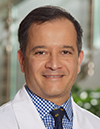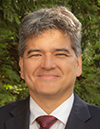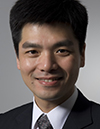Invited Faculties

Biography

Dr. Rajendra S. Apte is the Paul A. Cibis Distinguished Professor at Washington University School of Medicine in St. Louis, Missouri, where he serves as Vice Chair of Innovation and Translation in the Department of Ophthalmology and Visual Sciences, and is a Professor in the Department of Developmental Biology and Medicine. Dr. Apte received his medical degree from the University of Bombay and joined Washington University School of Medicine after obtaining a Ph.D. in Immunology at the University of Texas Southwestern Medical Center in Dallas, Texas, completing a residency at Parkland Hospital, and a retinal vascular and vitreo-retinal surgery fellowship at The Johns Hopkins University School of Medicine in Baltimore, Maryland. Dr. Apte was recruited to Washington University in 2003 and became a tenured professor at the School of Medicine in less than ten years. Dr. Apte is a vitreoretinal surgeon and clinician scientist. His basic research is focused on inflammation, aging, neurodegeneration and angiogenesis. His clinical research spans the translational spectrum from drug discovery and development to clinical trials. Dr. Apte has published extensively in basic and clinical peer reviewed journals and has participated as a principal investigator in numerous clinical trials. He was appointed in 2020 to be a Permanent Member of the National Eye Institute Board of Scientific Counselors.
Dr. Apte has won numerous awards, honors, and educational scholarships. Some recent highlights include: 2022 Ernst Bárány Prize from the International Society for Eye Research, 2022 UT Southwestern Medical Center Distinguished Alumnus, 2018 European Vision and Eye Research Certificate of Honour and Keynote Lecture; 2017 J. Wayne Streilein Distinguished Alumnus Award Lecture in Immunology; 2017 Macula Society W. Richard Green Award; 2017 Glenn Award for Research in Biological Mechanisms of Aging; 2016 Research to Prevent Blindness Nelson Trust Award; 2014 Research to Prevent Blindness Sybil B. Harrington Physician-Scientist Award for Age-Related Macular Degeneration; 2014 ASRS Presidents’ Award; 2013/2014 Carl Camras Translational Research Award, the Macula Society Young Investigator Award in 2013; Julie Martin Mid-Career Award in Aging Research from AFAR in 2012; the Macula Society Retina Research Foundation Cox Research Award in 2010; the American Retina Foundation Research Award in 2008; and the Research to Prevent Blindness Career Development Award in 2004. These awards accompany his 145+ peer-reviewed publications. His entrepreneurial activities include starting four life sciences companies and licensing several technologies, many of which are in human clinical trials. His research has been published in several high impact journals including New England Journal of Medicine, Nature, Cell, Cell Metabolism, the JCI, Nature Communications, PLoS Medicine, PNAS, JAMA Ophthalmology, among others.
Additionally, Dr. Apte has professional associations with the American Society for Clinical Investigation, American Academy of Ophthalmology, American Society of Retina Specialists, Association for Research in Visual Ophthalmology, Club Jules Gonin, the Macula Society, and the Retina Society.

Biography

Caroline R. Baumal, MD is a Professor of Ophthalmology at Tufts Medical Center and co-director of the retina service and medical retina fellowship at New England Eye Center in Boston, MA. She specializes in medical and surgical diseases of the retina and vitreous. Her research interests include novel retinal imaging and drug development, which are a continuation from her research background with the prototype OCT and working with drug implants and photodynamic therapy. Her clinical interests include age-related macular degeneration, diabetic retinopathy, retinal circulatory disorders, complex vitreoretinal surgery, and retinopathy of prematurity (ROP).
Dr. Baumal completed medical school and ophthalmology residency at the University of Toronto after undergraduate studies at McGill University. She completed two fellowships: one at New England Eye Center, Boston in Medical Retina and Lasers and another in Vitreoretinal Diseases and Surgery at Wills Eye Hospital in Philadelphia. Dr. Baumal is Board Certified by the American Board of Ophthalmology. She has received multiple awards from various societies including the American Academy of Ophthalmology, The American Society of Retinal Surgeons, The Retinal Hall of Fame, the Donald J. Gass Beacon of Sight Award from the Florida Ophthalmologic Society, the ASRS Crystal Apple award and was recently awarded the Lifetime Achievement award from the Vit-Buckle Society. She is on the editorial board for Retina Cases and Brief Reports and Ophthalmic Surgery, Lasers, and Imaging (OSLI) Retina. Dr. Baumal has authored over 170 publications, 33 book chapters on retinal diseases and edited the book Treatment of Diabetic Retinopathy. She is actively involved in mentoring and teaching vitreoretinal fellows and residents and was previously Director of Education and the Residency program at New England Eye Center.

Biography

He graduated from University of Sydney Medical School and trained at the Sydney Eye Hospital with fellowships at Royal Victorian Eye and Ear Hospital and in the USA. He was awarded a PhD for research into macular degeneration.
In Australia, other roles include clinician advisor to Department of Health Australia on new technologies in Ophthalmology. He has previously served as a board director of RANZCO and the Chair of NSW RANZCO.
In international ophthalmology he is currently the Secretary General of the Asia-Pacific Vitreoretinal Society (APVRS) and councillor of the APAO.
In charitable activities, He is President of the Sydney Eye Hospital Foundation. Dr Chang teaches vitreoretinal and cataract surgery in charitable eye camps in Cambodia.
Professional awards include the Achievement and Distinguished Service Award, the Outstanding Service in the Prevention of Blindness Award of the Asia Pacific Academy of Ophthalmology (APAO) and the Tano Lecture Award of the APVRS.
He is active in clinical research. He has published a recent book on Macular surgery which has profiled surgical practice, innovations, research and technology particularly in the Asia-Pacific Region. He is widely published in the scientific literature in retinal disease.
Dr Chang is active in training at the Sydney Eye Hospital the next generation of ophthalmologists and retinal surgeons from the Asia Pacific Region over the past 25 years. He has received the RANZCO Excellence in Teaching award.

Biography

Dr. Fawzi is a vitreoretinal surgeon and clinician-scientist, Professor in the Department of Ophthalmology. She holds the Cyrus Tang and Lee Jampol endowed Professorship and divides her time between her clinical/surgical practice and her NIH- and industry funded research at Northwestern University.
Dr. Fawzi’s lab studies animal models of ischemic retinopathies and her clinical research focuses on novel functional retinal imaging approaches including OCT angiography and Adaptive Optics. Recognized for her imaging research, Dr. Fawzi serves on the Editorial Boards of Scientific Reports (Nature), Plos One, Retina Journal and Investigative Ophthalmology and Visual Sciences, as well as serving on NIH study sections. She has authored/coauthored over 200 peer-reviewed articles, has delivered several named Lectureships and has been elected as member of the Retina, Macula and American Ophthalmological Societies. She has received the Honor Award of the American Society of Retina Specialists, the Young Investigator Award of the Macula Society, the Secretariat and the Achievement Awards of the American Academy of Ophthalmology and is a Gold Fellow of the Association of Research in Vision and Ophthalmology.

Biography

MA MB BChir (Cambridge) FRCOphth (UK) FRANZCO (Aust)
Managing Director
Consultant Ophthalmologist and Vitreoretinal Surgeon ,
OasisEye Specialists, Malaysia
Web: oasiseye.my
He graduated from the University of Cambridge, UK and completed his ophthalmology training in Western Eye Hospital and Moorfields Eye Hospital, London followed by vitreoretinal surgery fellowships in Cheltenham, UK and Royal Perth Hospital, Australia. He was appointed Associate Professor at the University of Malaya (UM) from 2009-2012 and founded the UM Eye Research Centre. He is the Immediate Past President of the Malaysian Society of Ophthalmology and Council Member of the Asia Pacific Vitreoretinal Society (APVRS) and was the Congress President of the 2017 APVRS Congresss in Kuala Lumpur. He is a member of the Vision Academy, co-founder of the Subthreshold Ophthalmic Laser Society, and Congress President for the 2023 APAO Congress in Kuala Lumpur.
Dr Fong has published more than 50 scientific papers in international journals as well as book chapters on cataract surgery and vitreoretinal surgery. He co-authored a book called “Food For Your Eyes” to raise awareness of Age-Related Macular Degeneration (AMD). This book was awarded Best Health Cookbook in the world by the Gourmand Cookbook Awards in Paris in 2013. He is a pioneer in the use of subthreshold laser for macula diseases and has run numerous clinical trials for laser as well as new anti VEGF therapies.
In 2015, he gave a prestigious live TED talk on myopia prevention to more than 5000 people in Kuala Lumpur. He is also an examiner for the Royal College of Ophthalmologists (UK) and was on the Malaysian National Specialist Registry committee for Ophthalmology.

Biography


Biography

Her leadership positions include the Board of American Academy of Ophthalmology, American Society of Retina Specialists (ASRS), Macula Society, Retina Society, Diabetic Retinopathy Clinical Research Retina network and JAMA Ophthalmology. She is only the second woman to serve as the President of ASRS and is a chair emeritus of Women in Retina.
Dr. Kim has received numerous awards and honors for her clinical excellence, leadership, and service and published over 200 papers and given over 500 presentations, including over 150 invited national and international presentations and named lectures. She has experience with over 60 multicenter clinical trials. She strives to be a bridge between the East and the West in ophthalmology.

Biography

Dr. Lauer is Director for Casey Eye Institute and Thiele-Petti Endowed Chair for the Department of Ophthalmology. He specializes in the care of patients with medical and surgical diseases of the retina and vitreous. He has served as investigator in clinical trials in the areas of ocular gene therapy, age-related macular degeneration, inherited retinal diseases, diabetic retinopathy, retinal vein occlusions, and retinopathy of prematurity. Dr. Lauer is recognized internationally as a leading ocular gene therapy surgeon. He has served as ophthalmology residency program director, retina fellowship program director and head of the vitreoretinal division.
Dr. Lauer completed his undergraduate training at the University of Rochester followed by medical school and internship at University of Oklahoma Health Sciences Center. He completed ophthalmology residency and vitreoretinal fellowship training at OHSU-Casey Eye Institute. Dr. Lauer serves as Chair for the American Board of Ophthalmology and former Chair of its Continuing of Certification program. Dr. Lauer is Chair Emeritus for the Accreditation Council for Graduate Medical Education Review Committee for Ophthalmology and is a member of the Association of University Professors in Ophthalmology Board of Trustees.

Biography

retina service and the Clinical Director of the Operating Theaters and inpatient services at the Singapore National Eye Centre.
Prof Lee also set up the Retina Clinic at the Diabetes and Metabolism Centre, Singapore General Hospital. She also chairs the Research and Innocation committee that oversees pilot grants at SNEC and SERI. She has an interest in surgeries for retinal detachments and the retinal complications of high myopia as well as imaging of the retina.

Biography

Dr. Yoko Miura is a faculty member of the Institute of Biomedical Optics at the University of Lübeck and a senior ophthalmologist at the Department of Ophthalmology of the University Medical Center Schleswig-Holstein, Campus Lübeck, in Germany. She graduated from Osaka City University School of Medicine in Osaka, Japan in 1997. She completed her ophthalmology residency at Osaka City University Hospital and Osaka City General Medical Center.
In 2002, she received her Ph.D. degree for her research on the effect of hepatocyte growth factor on RPE wound healing at the Osaka City University Graduate school of Medicine. In 2007, she joined the Department of Ophthalmology at the University of Kiel, Germany, as a research fellow to conduct basic research on retinal organ culture and retinal laser treatment.
In 2009, she moved to Lübeck and started her research works at the Institute of Biomedical Optics, and has been leading her research group since 2013. In 2017, she obtained habilitation. Meanwhile, she obtained her medical license and ophthalmologist certification in Germany and is currently involved in patient care, basic and clinical research, and education. Her research interests include minimally-invasive retinal laser therapy, laser-tissue interaction at retina, fluorescence lifetime imaging ophthalmoscopy (FLIO), and new OCT techniques such as dynamic and functional OCT. She is also actively engaged in research and collaboration to introduce artificial intelligence or virtual reality into these new ophthalmic diagnostics.
Biography

3. Scientific Committee Convener - VRSI
Citations : 3407
Journal Publications : 216
In Peer-reviewed journals : 194
Non peer-reviewed journals : 22
Chapters in text books : 27
Presentations in international conferences : 61
Presentations in national conferences : 248
Instruction courses conducted : 84
Been a vitreoretinal fellowship trainer since 1992 to present

Biography

Nowadays, he focused on the medical and surgical management of patient with many retinal diseases including age-related macular degeneration, diabetic retinopathy, and retinal detachment. He also is trying to do clinical and translational research toward developing new diagnostic tools and therapies for angiogenesis related retinal diseases including age-related macular degeneration and diabetic retinopathy. He also has been collecting genetic, proteomic and epidemiologic data on age-related macular degeneration, diabetic retinopathy, central serous chorioretinopathy and analyze genetic and proteomic profiles of Korean to elucidate the genetic marker and potential biomarker of these diseases.

Biography

2012 Neuro-ophtalmologie University Diploma, Université Pierre et Marie Curie Paris 6
2013 European Board of Ophthalmology
2008 - 2014 Medical School of Paris 5
2014 Imaging and Management of retinal diseases, Université Paris Diderot Paris
2008-2014 Resident in Ophthalmology, Paris
2014-2016 Surgical Fellow, Pr TADAYONI, Lariboisière Hospital
2017-2021 Surgical Consultant, Pr TADAYONI, Lariboisière Hospital

Biography


Biography


Biography

Dr Daniel Ting is a vitreo-retinal surgeon working in the Singapore National Eye Center (SNEC), and the Associate Professor with Duke-NUS Medical School. He is also the Director of Singapore Health Service (SingHealth) AI Office, SNEC Chief Digital and Data Officer and Head of AI and Digital Innovation in Singapore Eye Research Institute (SERI). Dr Ting was also a visiting J.W. Fulbright Scholar at School of Medicine Johns Hopkins University in exchanging his expertise for AI and big data in medicine. Dr Ting research focus spans across machine learning, deep learning, privacy preserving technology such as blockchain technology, federated machine learning and generative adversarial network, satellite technology (4G and 5G), explainable AI, driverless AI, conversational AI chatbot using natural language processing and cybersecurity (e.g., adversarial attack).
To date, Daniel has published >200 peer reviewed publications in high-impact journals, such as JAMA, NEJM, Lancet, Nature Medicine, Nature Biomedical Engineering, Lancet Digital Health, Progress in Retinal and Eye Research, Diabetes Care, Nature Digital Medicine, Ophthalmology and etc. One of his COVID-19 articles was published in Nature Medicine, entitled “Digital Technology and COVID-19” has so far been cited for >1000 times with >100,000 views, and also been referenced by the US Center for Disease Control and Prevention (URL: https://blogs.cdc.gov/genomics/2020/04/06/using-digital/).
Dr Ting serves in several AI leadership positions at the different AI and eye societies, including the EXCO in American Academy of Ophthalmology, Equator Network for AI guidelines - STARD-AI, QUADAS-AI and DECIDE-AI, and he also chairs the AI and Digital Innovation Standing Committee for the Asia-Pacific Academy of Ophthalmology. He also serves in numerous editorial boards in the top-tiered digital and medical journals, including Associate Editor for Nature Digital Medicine, Frontiers in Medicine, Frontiers in Digital Health and Asia-Pacific Journal of Ophthalmology; Section Editor in British Journal of Ophthalmology and Editor in Ophthalmology, Ophthalmology Retina, Ophthalmology Science, British Journal of Ophthalmology and Asia-Pacific Journal of Ophthalmology.
For the accomplishment, Dr Ting was recognized by many top-tiered international AI and ophthalmology societies in winning many prestigious scientific awards, including the
Biography

Christina Y. Weng, MD, MBA is a Professor of Ophthalmology and the Vitreoretinal Diseases & Surgery Fellowship Program Director at the Baylor College of Medicine in Houston, Texas. She has a faculty appointment at the Level 1 trauma center, Ben Taub General Hospital. Dr. Weng was a prior recipient of the Dan B. Jones Teaching Award.
Dr. Weng graduated cum laude from Northwestern University and then went on to medical school at the University of Michigan where she was elected to the Alpha Omega Alpha (AOA) Medical Society. While in Ann Arbor, she pursued an MBA degree from the University of Michigan-Ross School of Business and graduated with high distinction. Dr. Weng completed her ophthalmology residency at the Wilmer Eye Institute-Johns Hopkins University and surgical retina fellowship at the Bascom Palmer Eye Institute-University of Miami.
Dr. Weng is involved with multiple clinical trials; these include multiple DRCR Retina Network clinical trials and the AGTC Phase 1/2 intravitreal gene therapy study for X-linked retinoschisis. She also leads numerous research studies in her areas of interest: clinical/surgical outcomes, medical economics, healthcare quality metrics, and telemedicine.

Biography

After he finished his PhD at Chang Gung University, he completed his fellowship and Post-Doctorate Research with Dr. Michael Trese at William Beaumont Hospital, Royal Oak, Michigan, USA.
His main interest of research is in the field of pediatric retina, including retinopathy of prematurity, familiar exudative vitreoretinopathy, Coats disease, abusive head injury, pediatric retinal detachment, and other pediatric vitreoretinopathies.
He is currently the editor of American Journal of Ophthalmology Case Report. He has authored for more than 230 papers, one pediatric retina textbook, and 7 book chapters.
His recent awards include the American Academy of Ophthalmology Achievement Award (2021), Golden Paper Award, International College of Surgeon (2020), Excellent Paper Award of Chang Gung Memorial Hospital, Taipei, Taiwan (2019), Taiwan Macula Society Academic Award, Taipei, Taiwan (2018), Prof Rajvardhan Azad Oration Award, Raipur, India (2018), Achievement Award, Asia Pacific Academy of Ophthalmology, Taipei, Taiwan (2016).

Biography

Dr. Yilmaz spent six years on faculty at Baskent University, as Director of the Ophthalmology Department. His primary research interests focus on utilizing new technology and imaging techniques to better evaluate and manage vitreoretinal diseases. He has received grant funding by the Turkish Scientific and Technical Research Council, DFG(German Research Council, Köln University ) and a number of charitable foundations. He is a core team member of the Turkish Vitreo-Retinal Society; they have established clinical, teaching, and research collaborations.
Dr. Yilmaz also is a past president of Turkish Ophthalmology Society Ankara Branch. He moderated many important congresses and courses of ophthalmology. Dr. Yılmaz took part as a principal investigator in many international multicenter clinical trials. He has published more than over 100 articles in domestic and international journals.
He is an active member in a number of ophthalmic societies, including the American Society of Retina Specialists and Euretina Society and he is the Past President of the Turkish Vitreoretinal Surgery Society and now a member of the Turkish Ophthalmological Association Administrative Board.

Biography

Prof Zinkernagel has authored over 170 publications in peer-reviewed journals and is member of various international associations of ophthalmology. He is Editor in Chief of Ophthalmologica, EURETINAs official journal and serves as a board member of EURETINA.
